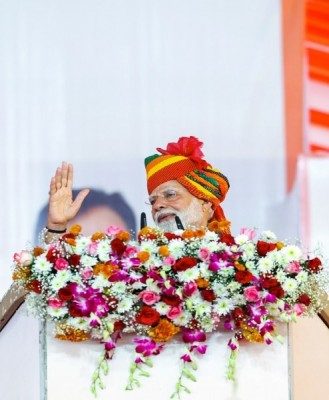
Venkaiah Naidu suggests 10 point charter to ensure effective functioning of legislatures
New Delhi, Dec 11 (IBNS): Vice-President M. Venkaiah Naidu on Monday suggested a 10 point charter to ensure effective functioning of legislatures in the country, so that peoples respect for the democratic institution can be sustained.
He spoke at length at a public lecture on “Importance of Legislatures” organized by PRS Legislative Research here.
Naidu outlined the core functions of Legislatures, their performance, challenges faced and the way forward.
He said “Wrong perceptions (of legislatures) are inimical to effective parliamentary democracy, as loss of faith of the people in their elected bodies erodes the functioning of democratic institutions.”
The Vice President stressed that contrary to the perception, the Parliament works round the year with the Department Related Parliamentary Standing Committees and other Committees of the Parliament enhancing the efficacy of the legislative, deliberativee and oversight functioning of the Parliament.
Naidu stated that the First Lok Sabha had 677 sitting and passed 319 Bills during 1952-57 while it was 332 sitting and 247 Bills in the case of the 14th Lok Sabha during 2004-09. The 15th Lok Saha had 357 sittings and approved 181 Bills.
He said that from these statistics it would not be correct to conclude, that the Parliament is shirking its responsibility.
Naidu explained that a total of 24 Department Related Standing Committees including 8 of the Rajya Sabha are undertaking rigorous scrutiny of the Demands for Grants of all the central ministries, legislative proposals and national level policy initiatives.
"These Committees have the power to summon senior officers of the Government and others concerned for obtaining evidence and information on related matters," said he.
He further said that while both the houses of Parliament met for about 70 days each during 2016, there were 400 meetings of the Department Related Standing Committees.
"With each meeting lasting over 2 to 3 hours with purposeful discussions and scrutiny, it amounts to another 200 sittings of the Parliament and this goes to prove that the parliament is working 24 X 7," the VP said.
The Chairman of Rajya Sabha felt that it is the repeated disruptions of proceedings, members of legislatures rushing into the well of the House and violation of the Rules of Business of the House and disregarding directions of the chair that are the prime reasons for negative perception of the legislatures by the people of the country and they need to be addressed.
For effective functioning of legislatures, Naidu made ten suggestions which include the following:
Measuring the productivity of the Legislature
Rajya Saha Chairman called for scientific measurement of the effectiveness and productivity of legislature on a scale of 1 to 10 based on the number of sittings, bills passed, bills held up, members’ participation, duration of debate on each bill, quality of debates and range of issues of public interest debated, extent of disruptions, reports of Committees submitted etc. He has also suggested similar assessment of performance of members of legislatures.
Ranking of Legislatures of the country
Noting that the states and urban local bodies are being ranked on various parameters like the GDP growth, infrastructure availability, social and human development indices, ease of doing business, sanitation etc. Shri Naidu said all the legislatures of the country can also be similarly ranked and making these rankings public would bring public pressure on the respective legislatures, governments and even the political concerned.
Quorum for Opposition Members
Stating that it would not be fair to hold only the governments and ruling parties responsible for ensuring quorum (minimum number of members) inside the House, Shri Naidu said such quorum should be made applicable to others as well, since every party represented in the house needs to have a stake in its effective functioning.
Notifying disruptions
Expressing concern over repeated disruptions of proceedings, members rushing into the well of the houses and disregarding the directions of the Chair, Shri Naidu suggested that legislatures may display the names of such members in public domain with an observation that they have violated the rules in disregard of the directions of the Chair and there by adversely impacting the functioning of the House.
Automatic suspension of members
To address the menace of members rushing to the well of the House Shri Naidu called for a provision of a specific provision in the Rules of Business for automatic suspension of members who do so.
Ensuring inclusive and enlightened legislatures
Shri Naidu called for taking forward the Women Reservation Bill for a fair representation of women in legislature besides reforms and education to ensure inclusive and enlightened legislatures.
Stressing on the need to maintain the ‘Constitutional balance ’under which legislature is mandated with law making, executive with the implementation of laws and the judiciary with the interpretation of laws, the Chairman of Rajya Sabha has said “ Courts can not be law unto themselves” and no one organ should cut into the domain of others.
Referring to some instances of the judiciary entering the domain of others, he gave examples of the apex court striking down of the Law for setting up a National Judicial Appointments Commission, imposing a Cess on the registration of vehicles in the National Capital Region last year, banning the use of diesel vehicles etc.
Support Our Journalism
We cannot do without you.. your contribution supports unbiased journalism
IBNS is not driven by any ism- not wokeism, not racism, not skewed secularism, not hyper right-wing or left liberal ideals, nor by any hardline religious beliefs or hyper nationalism. We want to serve you good old objective news, as they are. We do not judge or preach. We let people decide for themselves. We only try to present factual and well-sourced news.







